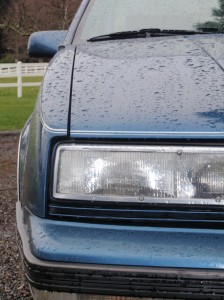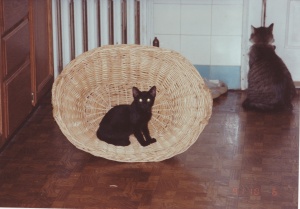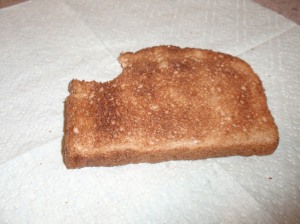 Like many other critters of his kind, Steve was a mischievous cat. Slender and black, except for two white hairs on his chest, he was a stray camping around with his siblings outside the building where I worked. His feline family was discovered one November day by the office manager, Peg, while she was outside on break having a smoke.
Like many other critters of his kind, Steve was a mischievous cat. Slender and black, except for two white hairs on his chest, he was a stray camping around with his siblings outside the building where I worked. His feline family was discovered one November day by the office manager, Peg, while she was outside on break having a smoke.
Peg was quite fond of cats. She had two in her high-rise condominium in downtown Chicago. She was so fond of them that she lost both friends and service people because of their antics. At a dinner party one evening, one of the cats leapt into the center of the dining table, where Peg had placed the gourmet pizza she had ordered for her guests. She described to me later the scene of the cat, kneading the stringy mozzarella, and the horrified reactions and quick departure of her guests. On another occasion, she told me how the other cat drove away an appliance repairman by dive-bombing him from its perch on the kitchen ceiling fan. Clearly, her cats ruled her life.
So when Peg saw the family of strays outside our office building, she took it as her mission to find them a good home, and I was one of her prospects.
Never mind that I already had one cat. Matilda was a gorgeous tabby, her thick gray fur accentuated by stunning green eyes and a snow-white bib and paws. She had been with me for several years and as many moves, from her original home in a double-wide trailer in south Texas with Confederate flags taped over the windows, to steamy Mississippi, where the cockroaches were large and fun to chase, and now to gray and frigid Chicago. Although she was a beauty to behold, her personality was not so attractive. She was a lazy cat. An ornery cat. And most of all, a gluttonous cat.
After one weekend away, I learned not to leave my apartment without first carefully securing the lid of the plastic tub of cat food and tightly closing the door to the pantry, where the tub sat on the floor. If I did not do so, Matilda would paw open the pantry door, push aside the loose lid, and gorge herself on kibble. It was no wonder she weighed 13 pounds.
Although I am a dog person at heart, if I were to have any pet at this stage of my life, it had to be an animal suited to my itinerant lifestyle. Besides traveling, I sometimes worked long hours and felt guilty about leaving Matilda at home alone. So when Peg began her assault on me in an attempt to place the strays, I was an easy target.
The Cat Comes Home
I held myself to taking only one of the strays, the pure black kitten, whom I christened Steve, and our period of mutual adjustment was brief. I quickly learned to close Steve out of my bedroom at night or he would claim my pillow for himself. I didn’t mind when he perched behind me on a chair, front paws on my shoulder, watching as I read the Sunday paper at my kitchen table. I was even amused the day I came home to find the stream of toilet paper flowing from the bathroom down the hall into the living room.
I worried for awhile about Matilda’s adjustment to her new roommate. The two of them didn’t seem to get along, often fighting over who got to sit in my lap while I watched TV. Matilda had never shown any interest in my lap before. I stopped worrying, though, when I came home early one day to find Steve and Matilda cuddled together in a chair. “Ah, you silly kitties,” I thought. “I’m on to you now!”
I did mind, however, when Steve took to leaping on my kitchen counters, and scattering crumbs of litter down the hallway after using the box. And I was disgruntled when he would pick fights with Matilda outside my bedroom door at 5 a.m. But I got really irked when he turned my new couch into his personal scratching post.
And so, ignoring all the recommendations of animal welfare groups everywhere, a few weeks after I brought him home, I took him to the vet to have his front claws removed. It was uneventful. I drove him to the vet’s office one Friday morning, and brought him home later that day, offending claws removed and one of those plastic cones around his neck to keep him from chewing out the stitches.
 He got along well for the rest of the day, but the next morning, he figured out how to wrest himself out of the collar and gnawed out the stitches in his right paw. I came home from
He got along well for the rest of the day, but the next morning, he figured out how to wrest himself out of the collar and gnawed out the stitches in his right paw. I came home from
mid-morning errands to see pools of blood at intervals down the hall to the living room and Steve, frantically running around the room, flinging blood from his paw onto every surface, especially the white couch. In a panic now myself, I dropped my bags, grabbed a towel, and snatched the cat up, wrapping his paw in the towel. Then I called the vet, raced to the car, and drove through Christmas-season traffic as quickly as I could, holding Steve on my lap with one hand and driving with the other. Meanwhile, trying to rid himself of the strange feeling, Steve continued flinging his paw about, spattering the interior of my car with blood.
After the vet sedated the cat and repaired the damage, I drove home with a sense of relief, puzzling over how to get dried blood off wood floors and out of a white couch. Those tasks were easy, though, compared to getting red blood out of the red upholstery of my car. I had parked in the garage and, to see better for the job, flipped on the dome light inside the car. Twenty minutes later, task complete, I headed back inside to a peaceful afternoon and a quiet weekend.
The Dilemma
On Monday morning, in a rush (as always) to get to work, I turned the key in the car’s ignition, only to hear that distinctive “ffffffft” that signals a dead battery.
Dammit. I’d forgotten to turn off the dome light.
Fortunately, my landlord was home and gave me a jump with the cables I carried in my trunk. So off I went to my office, to continue work on a manuscript I was editing for Dr. M, my boss in the neurosurgery department at the university. I parked my car in one of the last open spots on the fourth level of the parking garage, hoping I’d have enough juice in the battery to get to an auto parts store at the end of the day.
The Good Doctor
Dr. M and I had met a few years before in Mississippi quite by accident. I had been looking for jobs and had applied at the University medical center for a secretarial position in the EMT department. But someone processing the application made a mistake and sent my resume to the ENT department. There, it caught the eye of a doctor who noticed my degrees in English. He sent the resume on to his friend, Dr. M, who was looking for an editor.
Dr. M was a native of Syria, and had come to the US, like thousands of immigrants before him, looking for more professional opportunity and a better standard of living. After finishing his training in West Virginia, he gave up a private practice for the chance to work at the premier medical institution in Saudi Arabia, as a way of paying the debt he felt he owed to his Arabic culture. But after 4 years there in Riyadh, his American wife grew tired of the restricted life and the abaya, and he came to Mississippi with an ambition to climb the academic ladder, his ultimate goal being the chairmanship of a neurosurgery department. Along with him came a large, late-model Mercedes, which he had received as a gift from a patient in Saudi Arabia.
My ambitions were not so grand as his. I had come to M’sippi to follow a boyfriend and to look for a steady teaching job. The city where I’d been living in my native Ohio had long been saturated with college-level English teachers. I had applied at the medical center to tide me over till the proverbial “something better” came along.
And that something better did, indeed, appear.
I was at home one Friday afternoon when the phone rang. I picked it up, expecting it to be the boyfriend calling, but heard instead a strangely accented voice asking to speak to “Joo-leee.”
“That’s me,” I said, puzzled.
Dr. M told me his name and then said he wanted to hire me to be his editor. Having never met the man, I thought it best to arrange an interview. That interview eventually lead to a fulltime job as a medical editor, and over the years, we have collaborated on four books, two dozen book chapters, and many more journal articles. Even at that early stage of his career, Dr. M was gaining a worldwide reputation as a skilled skull-base surgeon.
Dr. M was a not an imposing man. Of medium build, in his early 40s, he had thinning dark hair, wire-rimmed aviator glasses, and a prominent nose fringed below by a mustache. Whenever he wasn’t in the operating room, he smoked incessantly, and his desk was littered with papers and cigarette ash, which he would paw through whenever he was looking for something. He was more than hospitable; he was generous, with a natural charm that he used to manipulate reality into what he wanted. Others would say of him, “There’s the real world, and then there’s Sam’s world.”
I was glad to be part of Sam’s world. He taught me much about the publication process and opened for me a professional opportunity I had never even considered. He brought me exquisite gifts from his many trips to academic meetings around the world, and supported my travel to professional meetings of my own.
Just How Good is the Doctor?
One evening, while out riding my bike, I hit a patch of loose gravel and fell, hitting my head on the pavement. I awoke in the ER to find Dr. M hovering over me. He was the neurosurgeon on call that night and he tended to me immediately, alternately scolding and teasing me about the accident, saying there were better ways to avoid coming to work the next day. He stitched up the gash in my head, kept me in the hospital for a couple of days, and then arranged for his wife to take me home and call my parents to assure them that I was OK.
A week later, when it was time for the stitches to come out, Dr. M came to my office with a package of sterile instruments. As I sat typing at my desk, he ripped the sutures out, all the while telling me a story of the first time he had removed stitches from someone.
It had been while he was in medical school back in Syria. His chairman had had a wound that had been stitched up and he chose Dr. M to remove the stitches. Sam gathered the necessary tray and instruments and, to compensate for his nervousness, took special care to sterilize the tools by pouring alcohol over them as they lay on the tray. Then, wanting to be especially careful not to endanger his chairman with infection, he decided to sterilize the instruments further. And so, he lit a match, and dropped it onto the tray.
Dr. M laughed as he told me the story. As demanding as he could be in his work, he also knew how to poke fun at himself. Despite the conflagration in his chairman’s office that day, Dr. M had gone on to a successful career in neurosurgery.
I once asked Dr. M why he became a brain surgeon. He answered, laughing, “It’s the only thing I could do well.”
One Evening in Chicago
For his part, Sam was very happy to have me be part of his world. I made his English sparkle, and eased his climb up the professional ladder. When his ambition outgrew his position and he was hired at a university in Chicago, he arranged to take me with him. I couldn’t resist. It was a step up in status and salary and a grand leap out of the South, with its oppressive humidity and laconic pace.
So in that chilly late November in Chicago, I left the office in the darkness of early evening to find that, once again, I needed an electrical bailout to get my car started. I walked all the way back to the office, cursing Steve the cat, to look for one of the residents-in-training, whom I knew was still at the hospital and would be glad to help me out of my predicament. Instead, I came across Dr. M, still at his messy desk (he’d given up the cigarettes by then), reviewing his mail and other papers.
“Joo-lee,” he said in that lilting accent I’d become familiar with, “what are you doing here? I thought you’d have gone home by now.”
“I’m looking for Andrew,” I replied. “My battery died and I can’t get my car started. He told me to come find him if I needed help.”
“Oh!” Dr. M said, looking concerned and starting to get up from his desk. I noticed the glint come into his eye. “Don’t worry. I will help you! Where is your car?”
I froze for a moment, wide-eyed in the doorway, trying to think fast. Here was a man of generous spirit and superb surgical skill, but one who was not so adept with problems outside the operating room. Not long before, his wife had had to take him to the emergency room when he cut his foot while trying to mow his lawn. On another occasion, he ended up in the ER after he injured his ankle trying to play basketball with his son. I really didn’t think it wise to accept his help now, but he was insistent.
“Let me take you to your car,” he said. “I will help you.”
“No, really, Dr. M, that’s OK. Andrew said that I should come look for him if I had any trouble. I’ll just go find him.”
“No, no” he said, smiling and chuckling. “I will help you.”
Another Dilemma
It was clear that he would, in fact, help me, whether I wanted it or not. And so I acquiesced, and dutifully waited while he gathered his coat and briefcase and turned off the lights in his office. And dutifully I walked beside him, down the hall, down the stairs, and out to the physician’s parking lot in front of the building, where we climbed in his big old Mercedes, the one he’d had shipped back from Saudi Arabia and was still driving through the frozen streets of Chicago. He fired up the engine, and we lumbered out of the parking lot and back toward the garage where my little hand-me-down Oldsmobile sat on the 4th floor.
 Up each ramp we rolled in the huge car. Enveloped in the smooth leather of the passenger seat, gliding through the darkness with only the glow from the dashboard instruments, I felt like a little girl in my father’s big car, feet not able to reach the floor, head barely touching the headrest. The car was cavernous, and comforting. We talked about the weather and other superficial things. I felt a little awkward being out of the usual confines and prescribed behaviors of the work world.
Up each ramp we rolled in the huge car. Enveloped in the smooth leather of the passenger seat, gliding through the darkness with only the glow from the dashboard instruments, I felt like a little girl in my father’s big car, feet not able to reach the floor, head barely touching the headrest. The car was cavernous, and comforting. We talked about the weather and other superficial things. I felt a little awkward being out of the usual confines and prescribed behaviors of the work world.
Finally we came to the stall where my car was parked, and Dr. M pulled the Mercedes up alongside and got out, leaving the engine running. I pulled out my keys and climbed into the driver’s seat of my car to open the hood. Then I went to the trunk and brought out the cables the landlord had used that morning. Meanwhile, Dr. M opened the hood of his car and came around to peer at my battery. He took the cables from me and clamped one end of each onto the battery posts of his car, talking both to me and to himself as he did so. We could see our breath in the cold night air.
 I sat down in the driver’s seat of my car, leaving the door open, and watched through the windshield, beneath the edge of the raised hood, while Dr. M placed the clamps on my car. He opened one clamp and attached it to one battery post; then he placed the second clamp on the other post.
I sat down in the driver’s seat of my car, leaving the door open, and watched through the windshield, beneath the edge of the raised hood, while Dr. M placed the clamps on my car. He opened one clamp and attached it to one battery post; then he placed the second clamp on the other post.
I couldn’t help myself.
“Um, Dr. M, shouldn’t one of the clamps go on the frame of the car?”
“Oh, no, no!” he said. “Don’t worry! I’ve done this before. Now, start the car!”
OK, I thought, perhaps he knew what he was doing. Maybe there was a chance this would work. I turned the key.
The starter ground; the car wouldn’t start. I turned the key off. Through the windshield, I watched as Dr. M adjusted the clamps.
“Dr. M, are you sure the clamps are in the right place?”
“Yes, yes!” he said cheerfully. “Try again!”
I turned the key again, and again, the starter ground. Nothing. I turned the key off.
“Um, Dr. M, I don’t think this is going to work.”
He readjusted the clamps.
“Try again!” he said brightly.
On the third try, the battery began to smoke. I sat there, amused and alarmed, watching the tendrils of smoke drift up from the battery. I could see his form hunched over the side of the car. I could see his surgeon’s hands repositioning the clamps as the smoke drifted over them.
On the fourth try, there were sparks.
I clapped a hand over my mouth and closed my eyes firmly against the blue and white points of light leaping off the battery and around his hands. Those hands, which were so adept, so skillful when working inside a human skull, and so inept under the hood of my car. My eyes squeezed closed, I sat there thinking, my God, I’ve ruined this man’s career. And all because of a silly cat.
Where There’s Smoke…
On the fifth try, one of the clamps melted off the cable, and Dr. M had to give up. Relieved, I turned the ignition off and got out of the car.
“Maybe we should call a tow truck,” I proposed. What other solution could there be?
“No, no!” Dr. M said, still cheerful, and chuckling a little. “I have some cables in my trunk.”
He wandered around to the back end of the Mercedes and opened the trunk. Fishing around among the rags and other junk, he hauled out a pair of old battery cables. As he raised them high over the trunk, we both noticed it. One of the clamps was missing.
Yes, indeed, he’d done this before.
He turned to me, still holding the cables up, laughing at himself, and I laughed too.
“We’ll call a tow truck,” he said, still chuckling, and a little red in the face. Perhaps it was from the cold. I had begun to shiver.
He put his cables back in the trunk and slammed it shut. Then he closed the hood of his car. We disconnected my cables and put them away with the loose clamp, and I closed up my car. I was shivering harder.
We climbed back into the Mercedes and he used his car’s phone to call a tow truck, all the while running the engine to keep the heater on. I tried to convince him to go on his way, that I would be OK waiting there for the tow truck to come. But again, he insisted. We sat in his car for half an hour, waiting for the truck, making light conversation to pass the time. He kept the engine running and the heater going.
Finally, we heard the loud motor of the truck as it entered the garage and climbed the same way we had come an hour earlier. The truck pulled up behind my car and the driver got out. At that point, I again encouraged Dr. M to go home, telling him that the driver would take care of things now. But again he insisted on staying.
And not just staying, but escorting me to the service station in his Mercedes. He didn’t want me to have to ride in the truck cab with the driver, so he followed the truck with me in his car. And he stayed with me at the service station until the new battery was in and I was on my way home to the cats.
Matilda Goes On… For a Little While
In the crush of daily life, too often our best moments and relationships slip away. By a year or so later, my relationship with Dr. M had begun to deteriorate. He was not happy in Chicago. In the Deep South, he had made up his own rules. The folks in Chicago wanted him to follow theirs. And he was still looking for the chance to run his own department. I found him increasingly difficult to work with and began to doubt my place in his world. I eventually left Chicago to take a job in Minnesota. Shortly after I left, Dr. M got his chairmanship and returned to the Deep South, where he still presides over the department he’s ruled for 15 years.
When I moved to Minnesota, I decided to take only one cat with me. I had grown tired of Steve’s nighttime mischief and staged spats with Matilda. I left him behind with the landlord’s children, who were thrilled with his antics and energy.
As for Matilda, well, with another move, she just became grumpier and fatter. After too many mornings of hearing her beg for food at 5 a.m., I found her a good home elsewhere and got myself a dog.

















